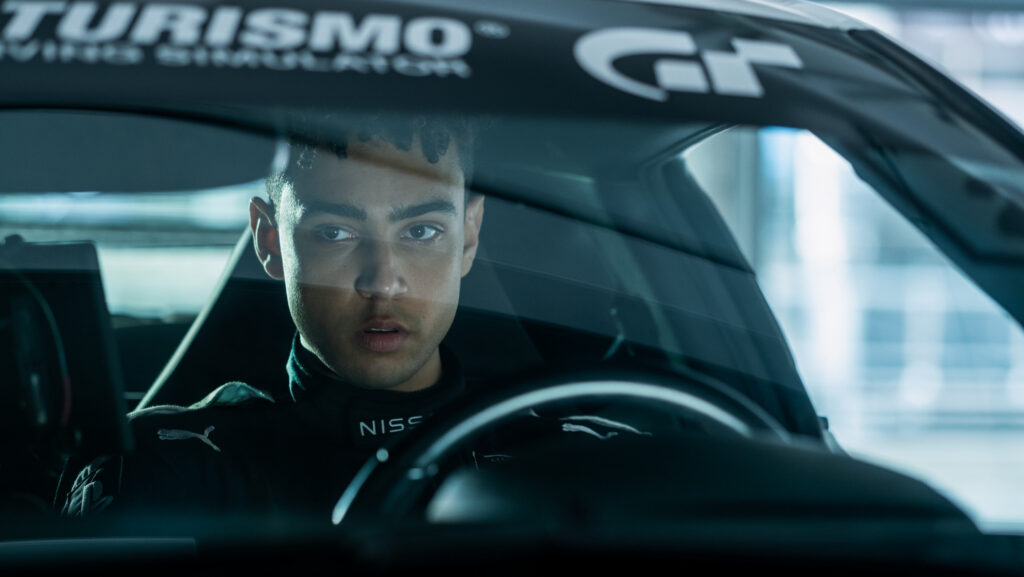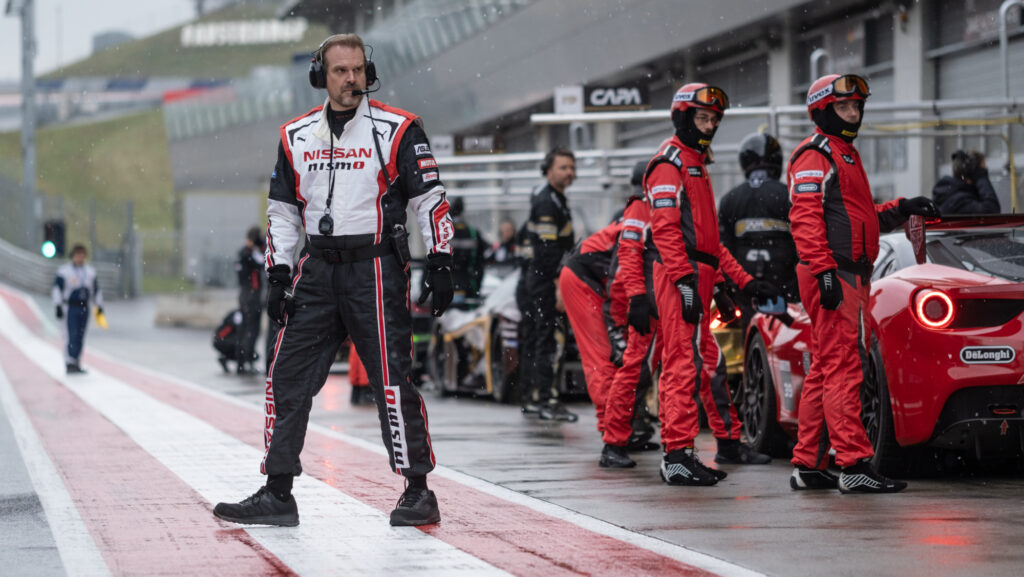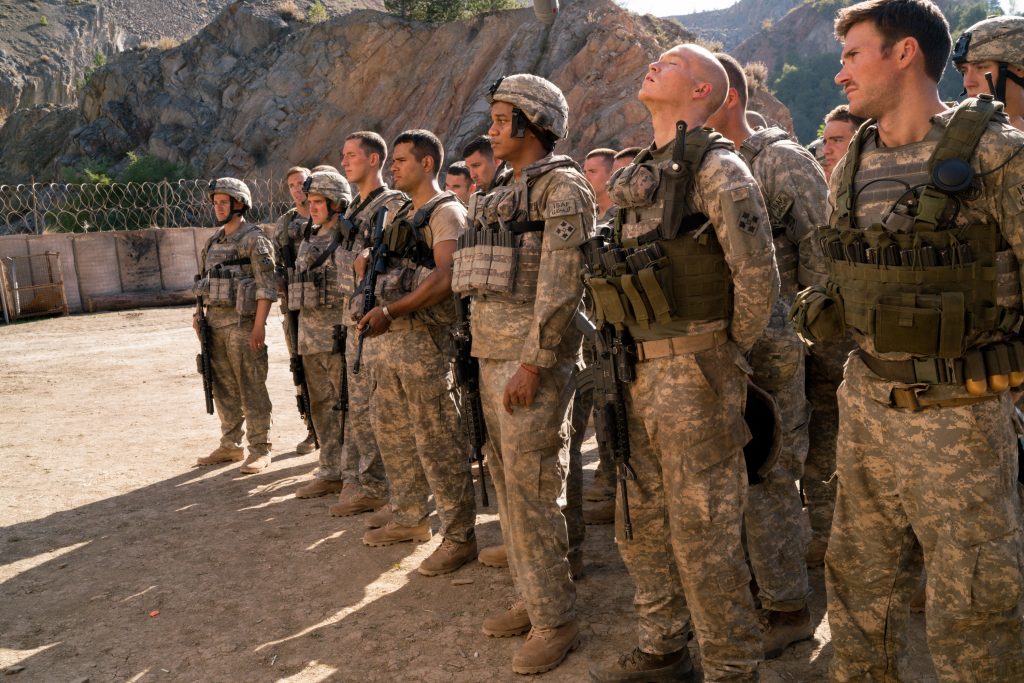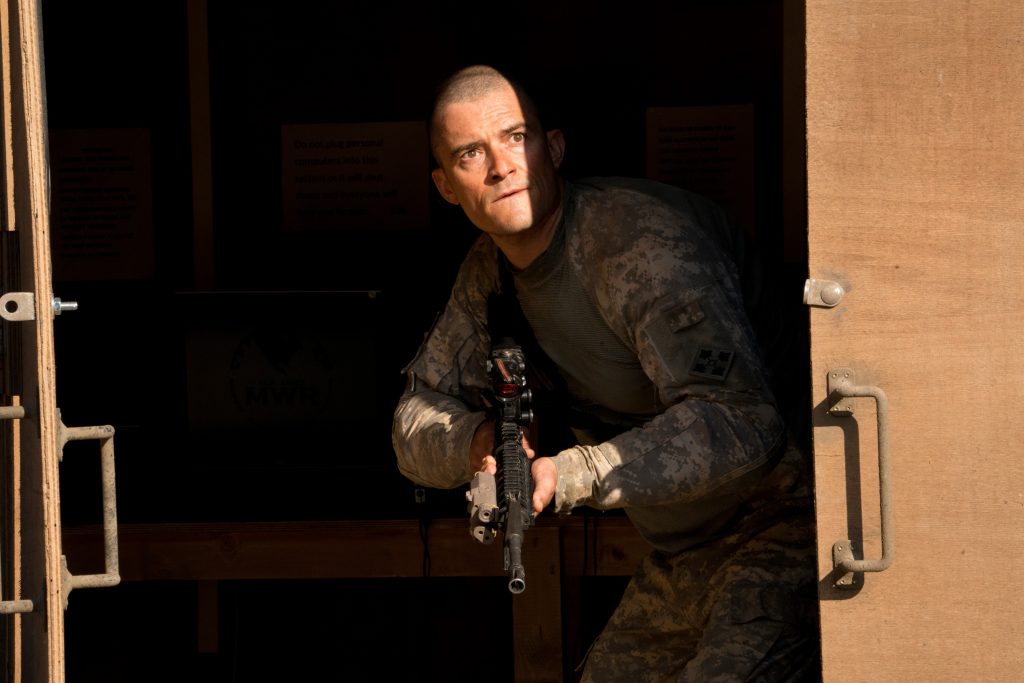August 2, 2023
by Carla Hay

Directed by Neill Blomkamp
Culture Representation: Taking place in Europe and in Asia, the action film “Gran Turismo” (based on a true story) features a racially diverse cast of characters representing the middle-class, working-class and wealthy.
Culture Clash: British video gamer Jann Mardenborough, an expert in playing the racing car video game “Gran Turismo,” is recruited to become a professional race car driver, but he faces naysayers, critics and his own self-doubt.
Culture Audience: “Gran Turismo” will appeal primarily to people who are fans of the “Gran Turismo” video games, the movie’s headliners, and stories about sports underdogs.

Based on true events, “Gran Turismo” offers crowd-pleasing action and capably acted drama in this story about a video gamer recruited to become a professional race car diver. This well-paced movie is a little hokey but not entirely predictable. If “Gran Turismo” hadn’t been based on many things that happened in real life, a lot of it would be hard to be believe.
Directed by Neill Blomkamp and written by Jason Hall and Zach Baylin, “Gran Turismo” (which takes place in Europe and in Asia) is named after Sony’s popular “Gran Turismo” video game series, where players can simulate being race car drivers. (Sony is also the parent company of Columbia Pictures, the distributor of the “Gran Turismo” movie.) The movie’s chief protagonist is a Brit named Jann Mardenborough (played by Archie Madekwe), a character based on the real Jann Mardenborough. Jann is a “Gran Turismo” gaming expert in Wales. He has his life changed forever when he is recruited to become a professional race car driver.
The movie shows that Jann’s introduction to being a professional race car driver had many setbacks, challenges, naysayers and supporters. The two men who make the biggest difference in Jann’s racing career are optimistic motorsport executive Danny Moore (played by Orlando Bloom) and jaded racing trainer/engineer Jack Salter (played by David Harbour), who is a former race car driver. These two mentors also get a lot of backlash for working with Jann and other video gamers who are recruited to try out for professional racing. Jack is a fictional character created for this movie, but Danny is based on real-life GT Academy founder Darren Cox.
In the beginning of the movie, Jann (who is in his early 20s) is a university dropout who has taken a job as a construction worker at the same place where his stern father Steve Mardenborough (played by Djimon Hounsou) works. Jann and Steve often have to work side by side on construction projects. Steve knows that Jann has wanted to become a race car driver since Jann was a child. However, Steve is doubtful that this dream could ever come true for Jann.
Meanwhile, Jann’s mother Lesley Mardenborough (played Geri Halliwell Horner—yes, she’s Ginger Spice of Spice Girls fame) is entirely supportive of whatever Jann wants to do with his life. Jann lives with his parents and Jann’s younger brother Coby Mardenborough (played by Daniel Puig), who is in his late teens. Steve tells Jann that Jann has to decide to go back to school or continue working with him in construction. “There’s no future in racing,” Steve firmly tells Jann.
Near the beginning of the movie, Danny is shown in Tokyo at Nissan headquarters. He is pitching a skeptical Nissan board member (played by Sadao Ueda) on the idea that the best “Gran Turismo” video game players in the world can also be the best race car drivers in the world. Danny’s idea is to have Nissan sponsor the winner of a worldwide contest where the “best of the best” Gran Turismo players in the world will train at GT (Gran Turismo) Academy. Of these trainees, only one will be chosen to go on the professional racing circuit and will be sponsored by Nissan.
Danny also goes to London, where he meets with Jack, a mechanic who works on the professional racing circuit. Danny tells Jack that he wants to hire Jack to be the chief trainer and chief engineer at GT Academy. Why? Because Jack has the skills, and he used to be a promising young professional racer about 20 to 25 years ago, until he quit after a fateful race at Le Mans.
Jack later reveals the details to Jann about what happened at that race. The story is exactly what you think it might be. When Danny initially approaches Jack about the GT Academy job offer, Jack thinks GT Academy is a terrible idea and immediately rejects the offer.
Back in Wales, Jann hears about this GT Academy contest from his best friend Persol (played by Nikhil Parmar), who encourages Jann to enter the contest. Meanwhile, Jann has a flirtatious crush on a local student named Audrey (played by Maeve Courtier-Lilley), but he’s too shy to ask her out on a date. Jann and his father continue to argue about what Jann wants to do with his life.
One night, after Jann, a friend named Percy (played Lloyd Meredith) and Coby have been out drinking alcohol at a nightclub, they are about to head home in a car that Jann is driving. Jann isn’t drunk, but he’s consumed enough alcohol to be over the legal limit. He could be arrested for driving under the influence. Jann is supposed to enter the GT Academy contest in just under 12 hours.
Jann, Percy and Coby are in a very good mood, until they see that police officers have put a checkpoint in their way and are stopping all drivers to check for anything suspicious. Jann, Percy and Coby get nervous, because they know that whichever cop stops them can probably smell the alcohol on Jann’s breath. It’s a one-lane checkpoint, and there’s a car behind them, so they can’t reverse and leave.
At first, Jann decides to play it cool and thinks he can get past the checkpoint without any problems. But as their car gets closer to a police officer who is stopping and questioning the drivers, Jann impulsively cuts in front of the other drivers and speeds away. The police give chase in their cars. Part of this scene is in one of the “Gran Turismo” trailers showing that Jann gets away with this driving stunt. It’s also shown in the “Gran Turismo” trailers that Jann gets into GT Academy. Jann’s father Steve obviously disapproves.
Jack ends up taking the job to be GT Academy’s chief trainer/chief engineer, after an incident where he was insulted by one of the young hotshot racers whom Jack had to work with as a mechanic. The guy who insulted Jack is Nicolas “Nic” Capa (played by Josha Stradowski), who is a sports movie cliché of being a “too cocky for his own good” main rival to the story’s underdog protagonist. Nic called Jack a “flamed-out has-been,” so Jack quit his mechanic job on the spot and then took Danny’s job offer to be the chief trainer/chief engineer for the GT Academy rookies.
Jack isn’t exactly the type of leader to give uplifting pep talks. The first time he meets Jann and the other GT Academy trainees in a group meeting (with Danny also in attendance), Jack tells all of the trainees that they will fail. In addition to Jann, the other GT Academy trainees are Matty Davis (played by Darren Barnet) from the United States; Avi Bhatt (played by Harki Bhambra) from Great Britain; Leah Vega (played by Emelia Hartford) from the United States; Chloe McCormick (played by Lindsay Pattison) from Great Britain; Henry Evas (played by Mariano González) from Spain; Klaus Hoffman (played by Maximilian Mundt) from Germany; Sang Heon Lee (played by Joo-Hwan Lee) from South Korea; and Marcel Durand (played by Théo Christine) from France.
From the beginning, Matty stands out as the most confident and skilled trainee. In practice races, he usually wins against the other trainees. And therefore, Matty is considered the frontrunner to be the GT Academy trainee who will be chosen to go on the professional racing circuit. Matty also excels in GT Academy’s media training classes, where he shows a knack for being charming in media interviews.
By contrast, Jann is insecure about his abilities and starts off being one of the average trainees in the group. In media training, Jann is awkward and timid in mock interviews. However, Jann is a very hard and determined worker, and he begins to improve until Jann and Matty are nearly equal in racing skills. It’s a somewhat friendly, somewhat tense rivalry.
Even with Jann’s progress on the racetrack, Danny privately tells Jack that Matty is Danny’s top choice to win the contest, because Danny thinks that Matty is more skilled at public relations. As far as Danny is concerned, Matty is the “perfect package” to represent GT Academy. Jack sees a lot of himself in Jann, because Jack also used to be an underdog who was insecure about his abilities.
Of course, you all know where this is going, because it’s already been revealed in the “Gran Turismo” trailers. Even if you already know the outcome, “Gran Turismo” does a very good job of creating suspenseful racing scenes, due in large part to talented cinematography from Jacques Jouffret. In the race that will determine who will be chosen to represent GT Academy on the professional racing circuit, Jann and Matty are the frontrunners and finish the race within a fraction of a second of each other. It’s up to Jack to decide who’s the winner.
Jann is far from being a star when he starts out on the professional racing circuit. He comes in last or close to last in several of his races, which take place in various countries, such as Austria, Germany, Turkey, Spain and United Arab Emirates. And he gets a lot of criticism from people who think racers should get to the professional level through the traditional way. Jack’s nemesis Nic is one of these haters. Nic’s father Patrice Capa (played by Thomas Kretschmann) owns the team where Nic is a star racer.
Even though Jack started off as very cynical about GT Academy, Jack is won over by Jann and some of the other trainees. In the face of all the backlash about video-gamers-turned-racers, Jack becomes Jann’s biggest supporter and champion. If the thrilling racing scenes are the heart of “Gran Turismo,” then the mentor/protégé relationship between Jack and Jann is the soul of the movie. As already shown in the movie’s trailers, Jann and Audrey begin a romance, but that that relationship isn’t nearly as interesting as the Jann/Jack relationship, where Jack almost becomes like a surrogate father to Jann.
“Gran Turismo” has a running joke about Jann having a ritual of listening to Kenny G’s “Songbird” and Enya’s “Orinoco Flow” to get him relaxed and ready for races. (An epilogue in the movie says that in real life, Jann Mardenborough actually does have this music ritual of listening to Kenny G and Enya.) Jann gets some teasing and curiosity about it from his colleagues, but he’s easygoing and shrugs it off.
“Gran Turismo” isn’t all fun and games. The movie gets into some heavy emotional territory when Jann experiences a life-altering race that causes a lot of trauma. One of the best parts of “Gran Turismo” is how people deal with the aftermath of what happens in this race. Madekwe and Harbour have standout scenes during this part of the movie. If anyone thinks that “Gran Turismo” is like the most recent mindless schlockfest movies in the “Fast and the Furious” franchise, then think again.
That doesn’t mean that “Gran Turismo” doesn’t have its share of mawkish moments. There are several scenes with slow-motion and freeze-frame shots that are a bit corny. Likewise, viewers might have mixed reactions to how director Blomkamp makes the racing scenes look like the “Gran Turismo” video games, with achievement levels shown in big letters on the screen. But when you’re making a movie for the same company that owns the “Gran Turismo” games, it seems like almost a requirement to make the movie look like the video games.
Fortunately, the “Gran Turismo” screenplay and the performances from the principal cast members don’t make it a soulless corporate movie, even though there’s plenty of product placement. No one involved in the racing circuit is presented as a nearly perfect hero in “Gran Turismo.” And even the “villains” have a realistic point of view, because they think racing is a sport that should be for people who trained in the traditional ways.
It’s not said out loud, but observant viewers of “Gran Turismo” can see that this type of gatekeeping has elitist overtones, because car racing has traditionally been a sport for people who can afford to train for it. By allowing video gamers to enter the sport, it makes it a more even playing field for people from more diverse economic backgrounds to participate. And that type of diversity is perceived as a threat to many people who have been accustomed to having only certain types of people involved in this sport.
Jann’s father Steve isn’t depicted as a terrible parent who degrades Jann. He’s a concerned parent who doesn’t want to see Jann get hurt physically or emotionally in Jann’s attempts to become a professional racer. Hounsou and Halliwell Horner don’t have a lot of screen time in the movie, but they give effective performances. They have a few tearjerking scenes in the movie.
Bloom gives a serviceable performance as Danny, whose character could have used more development. At times, Danny fades into the background of the movie, as the Jann/Jack relationship becomes the central storyline. The “Gran Turismo” movie could have been more realistic in showing Danny’s wheeling and dealing behind the scenes—it’s over-simplified, by having Danny being able to convince people to do what he wants after just one or two meetings.
“Gran Turismo” is by no means a masterpiece. It won’t be widely considered as one of the best car racing movies of the decade. But in terms of entertaining viewers with adrenaline-packed racing scenes and by having some meaningful humanity in the story, “Gran Turismo” delivers, and it’s a movie that can be enjoyed by people who know nothing about the “Gran Turismo” video games.
Columbia Pictures will release “Gran Turismo” in U.S. cinemas on August 25, 2023. A sneak preview of the movie was shown in select U.S. cinemas on August 2, 2023. Several other sneak previews pf “Gran Turismo” will take place in U.S. cinemas before the movie’s official U.S. release date.






